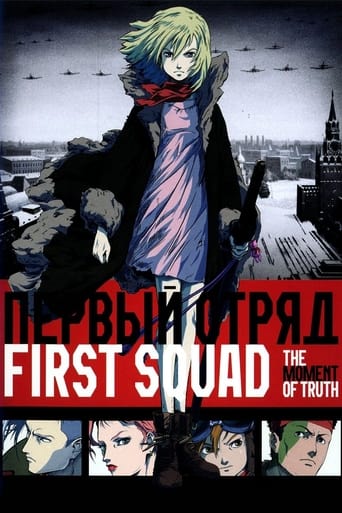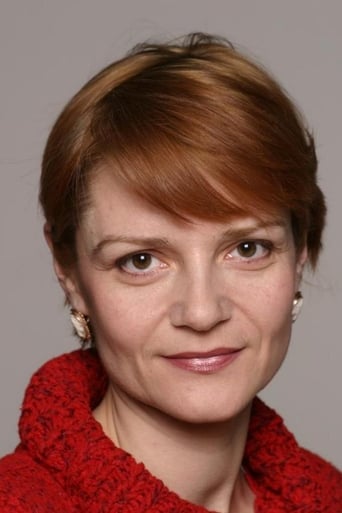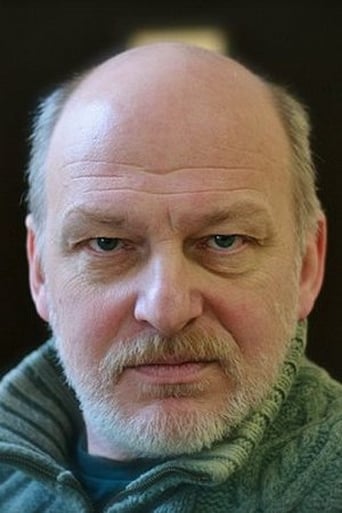TrueJoshNight
Truly Dreadful Film
Payno
I think this is a new genre that they're all sort of working their way through it and haven't got all the kinks worked out yet but it's a genre that works for me.
Freeman
This film is so real. It treats its characters with so much care and sensitivity.
Philippa
All of these films share one commonality, that being a kind of emotional center that humanizes a cast of monsters.
ursamechanica
First and foremost, I must assert that the live-action interviews of this film do not "interrupt" the story. Rather, they are used as a framing device to further the telling of the story, and to give rather tacit nods to the direction the story is headed. They add fascinating detail and lend weight to scenes that might otherwise have passed unnoticed or unremarked upon. Additionally, the live-action segments are used to tell the story as a mockumentary, a sort of play on the countless World War II documentaries that exist as a means of telling a story.Secondly, the notion that this work is offensive or disrespectful toward the Russian Sacred War is totally nonsense. The story holds Russia in a sort of reverence and depicts the Nazi forces in a negative light at all times. Its depiction of the war is fairly grim and realistic considering the fantastical elements added, but if that's the issue, then the war itself should be even more offensive to those who witnessed it first hand. If the issue is the fantastical elements, then that suggests that any fictional depiction of a real-world war is inherently offensive and wrong, as any fictional depiction includes elements that weren't present in the real world. The Men Who Stare at Goats, Hellboy, Abraham Lincoln: Vampire Hunter, 300, Inglourious Basterds, Apocalypse Now, Platoon, Full Metal Jacket, Braveheart, The Patriot, Dr. Strangelove, the list goes on. All of these are, by this logic, incredibly insensitive and inherently offensive depictions of events that are beyond fiction because of their very nature. To assert that any fantastical depiction of a real world event is somehow unacceptable is to actively limit and suppress the medium.**SPOILERS BELOW** Finally, I must address people's complaints with the film's ending. Nadya survives, the titular Moment of Truth is swayed in favor of the Russians, the balance of World War II subtly tips against the Nazis, the Russian captain survives, Ahnenerbe's plot has failed, and von Wolff retreats back into the Gloomy Valley, taking his sword with him. To hear people describe this ending, you'd think the Nazis had won and the film had just ended, but that's not the case at all. As I outlined, von Wolff is defeated. He retreats from the world of the living, taking the only thing allowing him to enter our world - his sword - with him. Ahnenerbe was only able to bring him back to determine the outcome of the Moment of Truth because they had his sword and now they don't. He's gone, effectively dead, but people still claim he somehow got off Scott-free. Another thing, Nadya's friends were also dead. Those in the Gloomy Valley died as soldiers and can be brought back through black magic or psychic connections to determine the course of history in predetermined Moments of Truth, thereby continuing to fight for their country with a chance to die permanently and move beyond the Valley. To assert that Nadya's friends disappearing somehow leaves something inconclusive is totally incorrect. Either they returned to the Gloomy Valley or they ascended into the afterlife beyond it. That was their purpose in the film, to help resolve the Moment of Truth, and it would make no sense for the movie to treat them any differently from anyone else returning from the Gloomy Valley. To have them resurrect and stay in the mortal world would be extremely inconsistent and cheapen death. What's more, to assert the movie ended too soon is to disregard the entire crux of the movie. The whole point was to sway the Moment of Truth in favor of Russia, with the First Squad getting involved only because Ahnenerbe involved warriors from the Gloomy Valley first. Once the Moment is passed and Russia is victorious, there's nothing left in the story to be told. Nadya won. The mission was a success.To put my feelings simply, the film was a fascinating departure from the normal trappings of the genre, paying homage to World War II documentaries through live-action interviews with decent actors and real WWII veterans as a framing device, that quickly and succinctly told the story it set out from the very beginning to tell and ended exactly when it should have. I feel some of the dissent people have over the film is largely based on the ending because it doesn't feel like a happy ending. There's no bright shiny rainbow, Nadya doesn't describe how she spends the rest of her days happy, and her friends don't miraculously come back to life. To dislike a film for playing a straight, no-frills but still positive ending instead of a saccharine perfect happy ending is totally nonsense, as that too limits what filmmakers can do. If this stigma against a serious, straight-faced ending is because the work is a cartoon, then that speaks to the bias against serious animated works in general, not to the quality of this work.The voice acting was spot-on, the sound effects fantastic, the character design and animation eye-catching and appealing, the story straight forward and unflinching, and the resolution tonally perfect.My only nitpick is that Nadya had a katana for no reason and the monk's survival seems unnecessary. Other than that, everything was spot-on.
Petr Ivanov
It is a true masterpiece. But not for mainstream hamburger eaters. The great story. The movie addresses history and a lot of Soviet era archetypes, as well as spiritual side of life. It makes the film interesting for any nation. A lot of people in Soviet Union was up-brought on the idea of spiritual strength of Motherland defenders and readiness to sacrifice own life defending Motherland. This makes them comparable to Japanese fighters. All of them were taught that the spirit of people is winning wars, not tanks or bombs. That's one of the ideas of the film as I see it. Though there are disputes now under way were Soviets good or bad guys in WWII, some facts are indisputable. 1) A most of German nation was brainwashed and declared themselves supermen. A lot of ideological, manipulative and even occult methods were applied to do it.2) The Soviet people faced a prospect of slavery and holocaust from Nazis. Though Soviet government was also very aggressive and did a lot to kill and convict a lot of Soviets as well, poor soviet people had no choice but fight for the survival. The survival of Motherland (even so cruel to own citizens), people, and family, culture and history, but not personal survival only. The chance to survive was minimal, but the spirit was very strong. The own live was something many of these people were ready to sacrifice for victory. It was mass heroism, and not fanaticism. Most of them were just usual people, not samurais or specially trained professionals. The wave of the people outrage towards Nazis was tremendous. Majority of fighters (unlike modern Islam kamikaze) did not believe in Heavens and rewards after life or heroic death, they knew that there were almost no chance to stay alive, they wanted victory and were ready to pay for it. And if after death they had a chance to fight, most of them were happy to do it. So many times Nazis were about to win, but something helped Russians again and again. E.g. Nazies were stopped in the Moscow suburbs with almost no Russian troops behind them. There were some other critical moments in this war when every little thing could play a main role in human history. If either Moscow or Stalingrad were captured, or in Battle of Kursk soviets were defeated WWII could be won by Nazis, US and UK alone without Soviets would never win the war, because Soviets paid the bloodiest price for the victory over the Nazis and were decisive power. So such moments are very interesting points of the history and issues in human psychology. The moments when the border between life and death is so illusive. I think that film creators by the artistic means succeeded to give a very interesting interpretation of such moments. So the film is a great and intellectual entertainment, it is much much better then thousands of other animated works. Great job guys! Thank you!
mmerova
I've just watched this movie which has been widely advertised as the first Russian anime. Why there should be a Russian anime if we already have a great animation legacy of our own is another question. There're just too many things wrong with this movie apart from being a "Russian anime".And first and foremost, it's an insult to Russian history and the Sacred War. I bet people would be speaking about it a lot... What makes it worse are the occasional comments from the "experts": historians, psychiatrists and war veterans, only the latter being the real people, everyone else being portrayed by the actors. They try their best to make the movie's story seem based on real events. Some people would take it as fiction and some, mainly the young audience, may take it as truth, which is quite worrying. And I really pity people of the war generation, our grandfathers and grandmothers who has seen the Great War with their own eyes and who might watch Firs Squad one day. Even if the Russians are behind the movie, the Soviet Union of the 40th is portrayed like in an average Hollywood movie. Excluding probably such clichés as drinking vodka... The story of is quite linear, simplistic and full of plot holes and plot devices. In a nutshell, a Russian girl Nadya who possesses supernatural psychic powers must team up with her dead friends to stop the undead Teutonic knights from changing the course of history. This is all there is, nothing more, nothing less. This movie has an unbelievable amount of deus ex machina and other devices, including:SPOILER ALERT!!!-during Nazi bombing Nadya is saved by a monk who for some reason happens to hang around the battlefield. This monk never introduces himself, but is so well aware of girl's quest that he gives her further instructions and even a horse which takes her directly to Moscow. The monk pointlessly sacrifices himself to protect escaping Nadya. -in order to resurrect the evil knights Ahnenerbe needs a powerful artefact which just happens to be in one of the member's possession.-Soviets, in return, need to somehow send Nadya to the world of the dead. An appropriate machine just happens to be waiting in the basement of the Kremlin. (Why they need a machine of such kind apart from using it in Nadya's mission is another question). -when in the other world Nadya is captured by the evil knights. Their leader recognizes her as a simple "mortal"(using his Predator-like vision mode) and sends her to the butcher. What? A random monk knows that this girl is so special and a mighty undead knight doesn't even question how she's got to the world of the dead in the first place? -of course, Nadya is saved by her dead friends who arrive just at the right time to a well-guarded knights'castle. -upon her return to our world Nadya sees that the monk who presumably died is alive and well. He's there only to share a couple more words of wisdom. Pffff... -during the final battle as the dark knights erupt from under the ice of the frozen lake Nadya's friends find a way to get into our world and save the day(of course!).(By the way, one of the veterans says that they were facing Nazis on the ice of the lake and were fighting for every trench. Is it possible to make trenches in the lake?)SPOILER ENDThe characters are as uninteresting as the story. The main heroine seems quite apathetic in what she's doing. It's not that she's passionately fighting for the Motherland, no, she just follows other people's orders, that's all. They tried to give her some depth trough a series of flashbacks, but they are not touching at all. I think that I didn't care at all for this character or her mission. Her friends have below zero personality. There is: love interest, funny guy... and two other kids, but it's hard to determine their roles, probably a tough guy and a tough gal. I don't even know why they're needed in this movie(except for deus-ex-machina-saving-the-day purpose). Their relationship with the main character is quite blank. They were good friends... So? Secondary characters and villains are even worse. I'm not into anime at all and to my eye animation and visuals were quite average. Nothing stylish, stunning or breathtaking. In conclusion, First Squad is a quite tasteless mix of Japanese sword fights, undead Pioneers, demonic knights with the Great Patriotic War on the background, with simplistic story and one-dimensional characters. I probably would have said, "Hey, if you're not gonna take it seriously and if you have a good sense of humor, go see First Squad!", if it wasn't such a painful topic involved. Our Scared War, the Great Patriotic War, is no laughing matter. And if people who has made this anime don't understand this... well, I pity them.I'll give First Squad two stars just for the animators' effort.
Krush_Burner
Well, I saw it just a few hours ago and must admit it was good - not great, not a masterpiece, but still well made story. Although I'm not a die-hard anime fan, this one looks interesting. Storyline revolves around a battle between secret Nazi and Soviet organizations which uses supernatural powers to win the war on Eastern front. Germans summon the spirit of an evil Teutonic knight and his minons, so the Soviets try to stop them with help of The First Squad - a group of teenagers with paranormal abilities. As for me, it sounds promising. Besides, story got a nice style anyway. If you're want to see some unusual story about the WWII, you gotta see that one.





